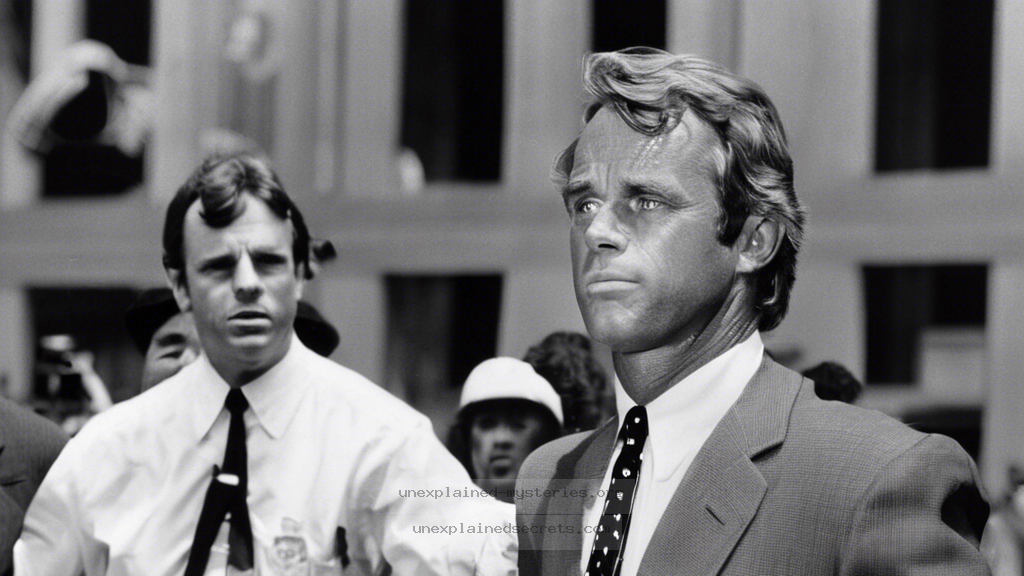Could the Mysterious Death of Robert F. Kennedy Jr. Be Linked to a Government Conspiracy?
Could the Mysterious Death of Robert F. Kennedy Jr. Be Linked to a Government Conspiracy?
The tragic assassination of Robert F. Kennedy in 1968 remains one of the most debated incidents in American history. It raises a pivotal question: was his death a result of a lone gunman, or does it point toward a broader conspiracy involving government entities? Understanding this mystery not only provides insight into RFK’s life and legacy but also sheds light on the complexities of political power and secrecy in the United States.
Historical Context: The Landscape of 1960s America
To comprehend the significance of RFK’s assassination, we must first explore the tumultuous landscape of 1960s America. This era was marked by profound social upheaval, the civil rights movement, anti-Vietnam War protests, and a growing mistrust of government institutions. The assassination of his brother, President John F. Kennedy, in 1963 had already left the nation reeling. RFK, who served as Attorney General under his brother, was seen as a champion of social justice and reform, which made him a target for those who opposed his progressive views.
RFK’s campaign for the presidency in 1968 was not just a political endeavor; it was a movement aimed at healing a fractured nation. As he sought to unite various factions of society, he attracted both passionate supporters and fierce adversaries. The assassination on June 5, 1968, just after delivering a victory speech in California, shocked the nation and left many questions unanswered.
The Official Account: A Lone Gunman?
The official narrative surrounding RFK’s assassination centers on Sirhan Sirhan, a 24-year-old Palestinian man who was arrested at the scene. According to law enforcement, Sirhan acted alone, motivated by his opposition to RFK’s pro-Israel stance. He was subsequently convicted of first-degree murder and sentenced to death, later commuted to life in prison.
However, this official account has been scrutinized heavily. Observers have pointed to inconsistencies in eyewitness testimonies, the number of bullets fired, and the physical evidence collected at the scene. Many witnesses claimed to have heard more than eight gunshots, while the revolver that Sirhan used could only hold eight rounds. This discrepancy leads to speculation about the possibility of a second shooter.
Core Theories: The Conspiracy Angle
Several alternative theories suggest that RFK’s assassination was not merely the act of a disturbed individual but rather the result of a conspiracy involving powerful entities. These theories fall into several categories:
- Government Involvement: Some theorists believe that government agencies, including the CIA or FBI, may have orchestrated the assassination to eliminate a political figure who threatened the status quo.
- Political Rivals: Others argue that rivals within the Democratic Party, fearing his potential to disrupt the political landscape, could have played a role in orchestrating his murder.
- Organized Crime: Given RFK’s aggressive stance against organized crime during his tenure as Attorney General, some believe that mobsters may have sought retribution.
Practical Implications: Evidence and Investigations
Over the years, various investigations have attempted to uncover the truth behind RFK’s assassination. In the late 1970s, the United States House Select Committee on Assassinations (HSCA) reviewed the case and concluded that RFK was likely the victim of a conspiracy. They cited evidence suggesting the possibility of a second gunman.
Despite these findings, the HSCA’s report did not lead to any new prosecutions or significant changes in understanding the assassination. The case remains officially closed, but many independent researchers continue to investigate. The proliferation of documentaries, books, and online forums dedicated to discussing the assassination have contributed to ongoing public interest.
Alternative Perspectives: Debunking the Conspiracy Theories
While conspiracy theories surrounding RFK’s assassination are compelling, it’s also essential to consider alternative perspectives that debunk these claims. Critics often cite the lack of concrete evidence linking the government or organized crime to the assassination. They argue that the evidence overwhelmingly supports the conclusion that Sirhan Sirhan acted alone.
Moreover, some researchers suggest that the proliferation of conspiracy theories can detract from the real issues at hand, such as the social and political climate of the 1960s that led to RFK’s appeal and his assassination. By focusing on a conspiracy, we risk oversimplifying a complex situation influenced by myriad factors.
Common Misconceptions and Clarifications
When discussing conspiracy theories, it’s vital to clarify some common misconceptions:
- All Conspiracy Theories Are False: While many conspiracy theories lack evidence, it’s important to approach each claim with an open mind and evaluate the evidence critically.
- Conspiracy Theories Are New: The idea of conspiracies is not a modern phenomenon. Historical accounts reveal that political intrigue has existed for centuries.
- Belief in Conspiracy Theories Indicates Paranoia: Believing in a conspiracy theory does not necessarily indicate mental instability; it may reflect a distrust of institutions.
Best Practices for Investigation or Study
For those interested in investigating historical events like RFK’s assassination, it’s crucial to adopt a systematic approach:
- Research Credible Sources: Focus on reputable books, academic papers, and documentaries that provide well-researched information.
- Evaluate Evidence Objectively: Examine the evidence for and against various claims without bias. Look for corroborating information from multiple sources.
- Engage in Discussions: Participate in forums or discussions with knowledgeable individuals to gain diverse perspectives.
Future Developments: Ongoing Research and Unanswered Questions
The mystery surrounding RFK’s assassination continues to invite scrutiny and debate. As technology advances, new methods of investigation could provide clearer insights into the events surrounding his death. For instance, forensic advancements in ballistics analysis may help resolve longstanding questions about the number of shots fired and the position of the shooter(s).
Additionally, the release of classified documents could shed light on the role of government agencies during this period. As more information becomes available, the narrative surrounding RFK’s assassination may evolve, potentially leading to new conclusions.
Conclusion: The Legacy of RFK and the Quest for Truth
Robert F. Kennedy’s assassination remains a haunting chapter in American history, encapsulating the tension, hope, and fear of a nation at a crossroads. While the official narrative points to a lone gunman, the whispers of conspiracy refuse to fade. Whether driven by a desire for justice, truth, or mere curiosity, the ongoing investigation into his death serves as a reminder of the complexities of political power and the impact of individual leadership on societal change.
As we continue to explore this mystery, we must remain vigilant and discerning, recognizing that the truth may be more intricate than it appears. Ultimately, the quest for answers not only honors RFK’s legacy but also encourages us to engage critically with the world around us.
Other Articles
Recent Posts
- What Happened to Flight MH370? The Conspiracy Theories That Still Haunt Us
- What Secrets Lurk Within the Walls of the Infamous Trans-Allegheny Lunatic Asylum?
- What Evidence Supports the Existence of Bigfoot in the Pacific Northwest?
- What Happened to the Indus Valley Civilization? Unraveling the Mysteries of Ancient Urban Life
- Can Telepathy Be Scientifically Proven Through Laboratory Evidence?







